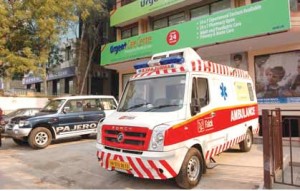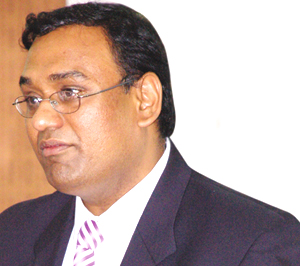
 Dr Pervez Ahmed,
Dr Pervez Ahmed,
Founder-Chairman and Managing Director,
Aapka Urgicare Pvt Ltd
In conversation with Shally Makin, ENN, Dr Pervez Ahmed, the Founder-Chairman and Managing Director Aapka Urgicare Pvt Ltd puts together his thoughts of coming up with his new venture.

What was the inspiration behind the launch of this centre?
The question was what we can do in the healthcare delivery system, the thought was to come up with tertiary care hospitals with such system that can benefit the patient. A concept of emergency medical care was initiated so that the nation has one number to call. With accidents increasing in the late night, roads are clearer and there is no medical emergency centre available to take care of them. To recognise critical care availability and accessibility, the delivery systems in neighbourhood was set up. In case of urgency, say breathlessness or asthma attack, conventionally there were only two options “ to go to the neighbourhood doctor who may not have the equipments, medicines or staff support to provide relief; or else visit the emergency ward of a hospital. Most state-of-the-art hospitals that provide quick and quality care are either expensive or out-ofreach for many. This leads to much avoidable suffering, deterioration of the condition and even fatalities that can be reduced to a greater extent if the patient is brought to a quality medical facility within the golden hour “ the hour after the actual medical emergency, say for instance accidents, when it is crucial to extend the correct diagnosis and treatment to the affected person.
How was the model conceptualised?
The pioneering model of neighbourhood urgent care facilities that are open round-the-clock to attend to emergency medical situations originated in the US in the 1970s in response to the need for medical centres that would act as half-way house between the primary are doctor and the hospital emergency room. On similar lines, we have moulded these four centres with most trivial medical patient need, stabilise patients and transport the patient in a well equipped ambulance to the required hospital or home. Emergency care is ased on economics and this model is differently studied when it comes to acute care. A concept of primary health care is not here, the odels of delivery will change, depending upon the urgent care centre success, unlike the presence of tertiary hospitals at every 5-10 m radius in the coming times. The emergency patient needs immediate care so that it doesnt get protracted and end up spending days in the hospital, this will in turn increase cost of care. We want to provide a value in our services, which seems to be missing in terms of ealthcare.

 A pioneering model in India promoted by healthcare industry veterans, the chain of Urgent Care Clinics will be accessible 24×7. Also known as Immediate Care or Walk-in Medical Care, Urgent Care Clinics expand the healthcare options of the primary care doctor, the hospital emergency rooms and other healthcare clinics, serving to bridge the gap between these options too. The clinics deliver ambulatory care through dedicated facilities for immediate medical treatment outside a hospitals emergency department, on an unscheduled time or walk-in basis
A pioneering model in India promoted by healthcare industry veterans, the chain of Urgent Care Clinics will be accessible 24×7. Also known as Immediate Care or Walk-in Medical Care, Urgent Care Clinics expand the healthcare options of the primary care doctor, the hospital emergency rooms and other healthcare clinics, serving to bridge the gap between these options too. The clinics deliver ambulatory care through dedicated facilities for immediate medical treatment outside a hospitals emergency department, on an unscheduled time or walk-in basis
What value added services do you provide apart from the emergency cases?
Transporting a patient for further treatment generally opts for 50- 50 ratio to public and private hospitals respectively. We are adding value to the services by consulting and advising the right hospital for the patient. There are currently 38,000 doctors and India requires 1, 40,000 of them to treat the illness prevailing in India so far. We are adding value to the healthcare fraternity. We are open 24×7, along with OPDs. We are the only specialised centre to offer pediatric emergency training system. We provide minor operating procedures, injuries, cuts and we can take care of all minor injuries at the centre itself. We work with other doctors and train them for emergency medicine. We work on data which can be transferred online; data is stored on cloud, with IT partner as Ohum providing HR service and Shristi as HIS healthcare provider.
What are your expansion plans?
We need a strong model of providing accessible and affordable walk-in emergency care to patients in their neighbourhoods to progress in our healthcare goals. Many such fatalities can be avoided and many accident victims helped without wasting any time if urgent care centres are present in densely populated neighbourhoods and are accessible 24×7 in places that report more accidents. These are equipped with the latest technology and offer life-saving procedures by trained doctors, nurses and other paramedical staff who can handle all kinds of emergency health situations. We have decided to make impact in the deliveries, we have mapped clusters. In Delhi 30- 34 centres are projected. We have signed up for a third centre in Okhla, Delhi which will be ready by the end of the March and the forth one in North Delhi will be coming up by the first week of April . The criterion to map the location of the centres primarily depends on population, number of hospitals in the nearby area. Secondly, the mid tier level people as affordability is what we offer at our centre. We need to create awareness and spread the concept of emergency care, work directly with customers. We have strategically worked in creating Delhi as the first preferred destination for developing the chain. To start with, we need to create a national brand with a vision of creating 110 centres in 4-5 years in Kolkata, Varanasi and Uttar Pradesh.
Be a part of Elets Collaborative Initiatives. Join Us for Upcoming Events and explore business opportunities. Like us on Facebook , connect with us on LinkedIn and follow us on Twitter , Instagram.











